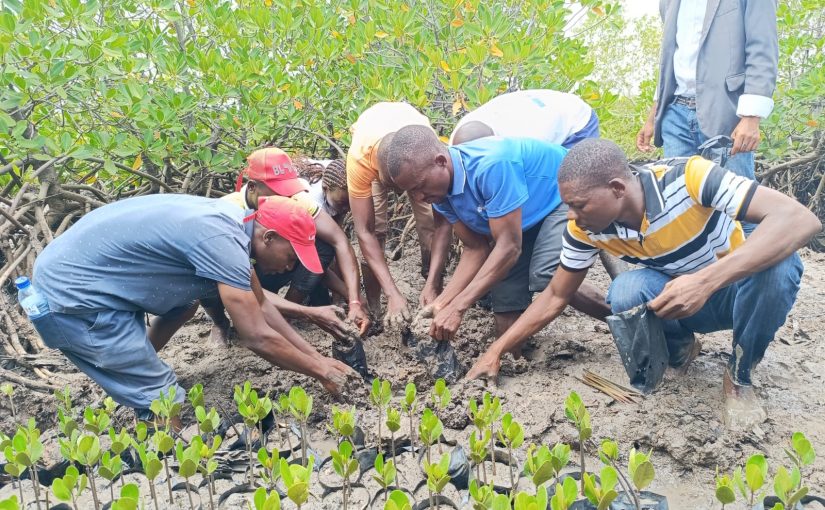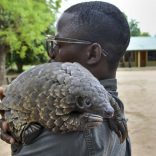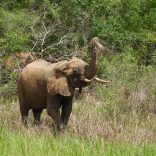Mozambique: Three arrested for attempt to sell a pangolin say they had two, ate one
Mozambique: Lisbon’s Nova SBE restores, conserves mangrove forest

File photo: @mozambes/X
Nova SBE announced in a statement on Friday that around 18 hectares of forest have been restored in Sofala province, Mozambique, through the MozambES programme, which proposes the conservation and restoration of mangrove forests.
‘The project has achieved significant results over its three years of implementation. In addition to the scientific outputs already produced and the involvement of a multidisciplinary team of Portuguese and Mozambican researchers, to date, 15 clearings of the devastated mangrove forest have been replanted, covering a total of 18 hectares,’ said Margarida Ortigão, a researcher at the Nova SBE Environmental Economics Knowledge Centre, one of the entities developing MozamBES, in partnership with Nova IMS, Eduardo Mondlane University and the Nhangau Natural Resources Management Committee.
According to the press release, the MozambES social and environmental research project aims to promote the active involvement of residents and, through financial compensation, encourage environmental restoration and conservation. More than 200 local inhabitants have already been included.
‘The total budget of this project for the three years of implementation is €242,000, of which €145,000 has been allocated to Nova SBE,’ Ortigão told Lusa, explaining that this amount, ‘in addition to the research work, includes the expenses associated with implementing the pilot conservation programme (…)’, among others.
‘It also includes logistical costs and small monetary incentives given to savings and rotating credit groups, which actively participate in conservation activities over 10 months,’ explains the researcher at the Nova SBE Environmental Economics Knowledge Centre.
The local communities – organised into rotating savings and credit groups that provide economic support to local inhabitants by facilitating loans, financial education and the development of entrepreneurial skills – are already fully active in the community of Nhangau, near the city of Beira, distributed among 10 savings and credit groups.
The MozambES project provides participants in the restoration programme with small amounts of financial support. In return, each group has the duty to replant a pre-designated area of the devastated forest and ensure that it is well maintained.
According to Nova SBE, the entire project is being monitored by the Nhangau Natural Resources Management Committee in collaboration with Alberto Charrua, the researcher responsible for implementing the programme and a professor at the University of Licungo in Beira.
‘The biggest challenge facing the project is logistical, due to the remote location and difficult accessibility of the intervention areas,’ according to Ortigão.
Regarding the importance of mangrove forests, Ortigão says that they ‘are recognised as one of the most productive ecosystems on the planet and play a vital role in Mozambique, both environmentally and socio-economically. One of its most important contributions is coastal protection, acting as a natural barrier against erosion and the effects of storms.’
In addition to their extreme importance in mitigating and adapting to climate change, mangrove forests, which face numerous global threats due to urban sprawl and extractive activities, also play a crucial role in supporting the economic activities of local communities.
The MozambES project, funded by the Aga Khan Development Network (AKDN) and the Foundation for Science and Technology (FCT), aims to contribute to the more sustainable management of local natural resources.
New Publication!!
Mangrove community-based management in Eastern Africa: experiences from rural Mozambique
Full paper here: https://t.co/Kjtr4KvPn1 pic.twitter.com/PUYoBicA3f
— MozambES project – Mangrove PES in Mozambique (@mozambes) June 19, 2024
The MozambES team is in the field, preparing the implementation of the mangrove conservation scheme which will be developed in Nhangau. Watch our training team on the ground, gearing up for the innovative mangrove conservation program. pic.twitter.com/2KVkQZQ580
— MozambES project – Mangrove PES in Mozambique (@mozambes) March 8, 2024
Engaging savings groups in Nhangau, participants will be hands-on in conservation activities, from seed gathering to reforestation. In return, they’ll benefit from improved credit conditions, including lower interest rates and a boost to the group’s social fund.
— MozambES project – Mangrove PES in Mozambique (@mozambes) March 8, 2024
In April 2023, the MozambES team visited the study site of Nhangau, (Beira district) to meet with local authorities, conduct focus groups with different target groups and to collect ecological data using drone images. #mozambes pic.twitter.com/2e1719FIzH
— MozambES project – Mangrove PES in Mozambique (@mozambes) April 21, 2023













Leave a Reply
Be the First to Comment!
You must be logged in to post a comment.
You must be logged in to post a comment.